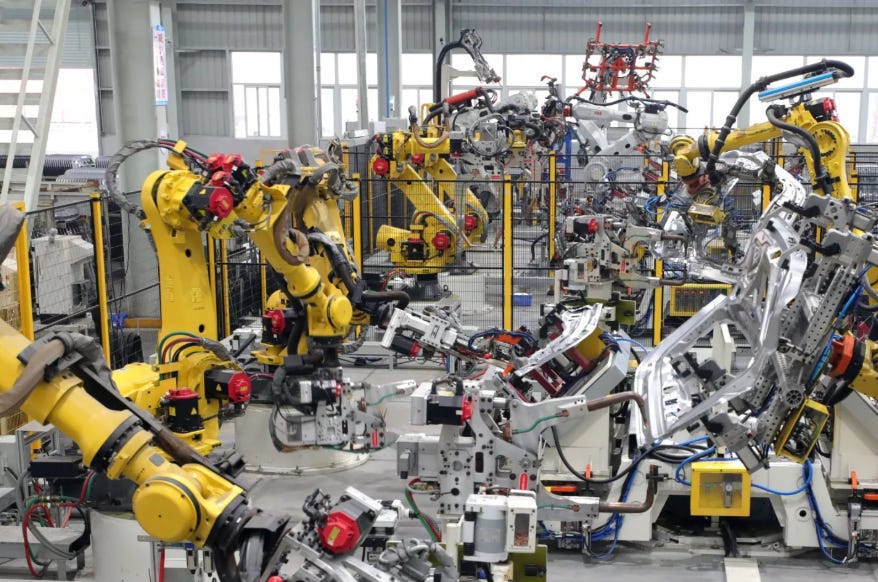- Yaro on AI and Tech Trends
- Posts
- 🚀Will Tariffs Speed Up Robotics?
🚀Will Tariffs Speed Up Robotics?
Plus: AI Companies sacrifice safety for speed.
Get in Front of 50k Tech Leaders: Grow With Us
Friday is here! We hope you enjoy the weekend—and some extra time with your kids if they’re on break.
We’re leaving you with a quick piece on how the new tariffs’ main purpose may be to accelerate robotics and AI automation. When combined with lighter tech regulation, this could trigger a wave of innovation, unlike anything we’ve seen before.
Curious to hear your thoughts—drop a comment and let us know. Let’s dive in…
Will Tariffs Speed Up Robotics?
🧰 AI Tools
AI Companies sacrifice safety for speed.
📰 News and Trends.
AI Turns Text Into Real Walking Robots in a Day.
Will Tariffs Speed Up Robotics?

The US administration’s tariffs, which are breaking havoc in economies worldwide, are supposed to aim to boost U.S. manufacturing but may inadvertently accelerate automation. Facing increased production costs and labor shortages in the United States alongside the challenge to find engineers in the US and other third-world countries may lead to companies investing more in AI and robotics to maintain competitiveness and lower costs. We have seen great advancements in automation technology, and now you can get a humanoid for less than $16k. Imagine what robots companies will be able to acquire to create their products, including middle and small manufacturers. The delivery industry has already started to use robots from factory to door with the use of drones and ground delivery with cooler-like automated devices.
This shift could disproportionately affect middle- and low-income workers, as roles in sectors like manufacturing, retail, and logistics are more susceptible to automation. Studies indicate that up to 47% of U.S. jobs could be automated, with low-wage positions at higher risk. But higher-end jobs are also being disrupted fast due to the rise of AI agents evolving from simple chatbots to autonomous systems capable of executing complex enterprise workflows. AI coding models, and those models that can be programmed into robots. While automation can lead to new job creation in tech and engineering, these often require specialized skills, potentially exacerbating income inequality.
But to get all these advances going the energy demand will continue to increase and the tariffs will raise costs on key renewable energy imports like solar panels, wind turbine parts, and EV batteries—materials crucial for powering data centers used by AI companies. Despite U.S. clean energy tax credits spurring domestic investment, 80%+ of components still come from abroad, mostly China and Southeast Asia.
To mitigate these effects, policies such as wage subsidies, retraining programs, or even a "robot tax" have been proposed to support displaced workers and ensure a more equitable transition in the labor market.
Elon Dreams, Mode Mobile Delivers
As Elon Musk said, “Apple used to really bring out products that would blow people’s minds.”
Thankfully, a new smartphone company is stepping up to deliver the mind-blowing moments we've been missing.
Turning smartphones from an expense into an income stream, Mode has helped users earn an eye-popping $325M+ and seen an astonishing 32,481% revenue growth rate over three years.
They’ve just been granted the stock ticker $MODE by the Nasdaq—and the share price changes soon.
*An intent to IPO is no guarantee that an actual IPO will occur. Please read the offering circular and related risks at invest.modemobile.com.
*The Deloitte rankings are based on submitted applications and public company database research.
AI Companies sacrifice safety for speed.

OpenAI has significantly reduced the time spent on safety testing its newest AI models, cutting evaluations from several months (as with GPT-4) to just a few days for its upcoming o3 model. Insiders say the tests are now less thorough, raising concerns that the company is prioritizing speed and competition—particularly against Meta, Google, and xAI—over public safety. Despite committing to rigorous fine-tuning for misuse risks like bioengineering, OpenAI has only applied such testing to older, less powerful models.
Critics also note that safety checks are often performed on early “checkpoint” versions rather than final public releases. The EU’s AI Act, set to take effect later this year, will mandate testing for advanced models, but currently, no global standards enforce this. While OpenAI claims its streamlined, automated evaluations are sufficient, former staff and researchers argue that the company is underestimating serious risks in pursuit of rapid deployment.
📰 AI News and Trends
Using AI effectively is now a fundamental expectation of everyone at Shopify.
EU Bets on Gigafactories to Catch Up With U.S., China in AI Race
ChatGPT now memorizes all past conversations.
Thinking Machines Lab, the new AI startup from ex-OpenAI CTO Mira Murati, is reportedly attempting to close one of the largest seed rounds in history.
Trump administration backs off Nvidia's H20 chip crackdown after Mar-a-Lago dinner.
WordPress new website builder will create a website with a simple prompt.
🌐 Other Tech news
Musk’s Doge fired self-drive car safety experts at an agency that regulates Tesla.
Apple airlifted 600 tons of iPhones to the U.S. to beat tariffs as customers scramble to secure devices before possible price increases.
Waymo readies autonomous cars for first international tests in Japan.
EU could tax Big Tech if Trump trade talks fail, says von der Leyen
AI Turns Text Into Real Walking Robots in a Day.
Researchers at Duke University have created Text2Robot, an AI system that can turn simple text prompts into fully functional 3D-printed walking robots—within 24 hours.
The system bypasses the need for expertise in mechanical engineering or coding. Users just describe the robot (e.g., “a six-legged robot that walks on uneven terrain”), and the AI handles design, simulation, optimization, and real-world feasibility.
Multi-stage AI pipeline uses a large language model and reinforcement learning.
Robots are 3D printable and built with off-the-shelf parts.
Won 1st place at the 2024 Virtual Creatures Competition.
Will debut at ICRA 2025 in Atlanta.
Open doors for non-experts to build robots for education, surveillance, healthcare, and more.
It’s being compared to the GUI revolution—making robotics as easy as writing a document.
🧰 AI Tools
Download our list of 1000+ Tools free


Reply